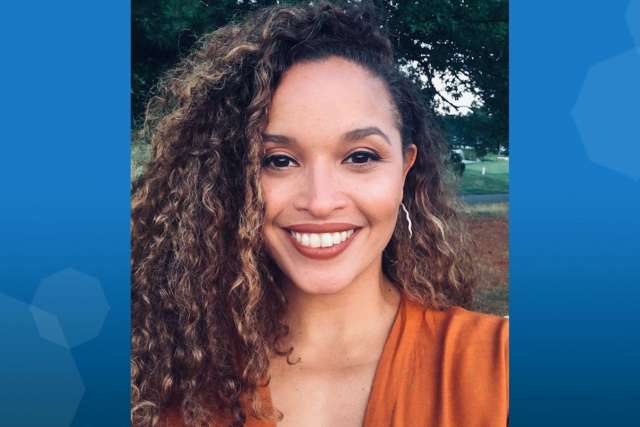Every year on Nov. 1 and 2, in observance of Día de los Muertos, Latino and Hispanic families dust off old photos of their deceased loved ones and set up altars either in their homes or at gravesites with ofrendas (offerings) that their family members once enjoyed – such as food, beverages and memorabilia.
Mirella Díaz-Santos, PhD, assistant professor-in-residence in the departments of Neurology and Psychiatry and Behavioral Sciences at the David Geffen School of Medicine at UCLA, used the holiday to raise awareness for Alzheimer’s disease among the Hispanic/Latino community and to honor loved ones through health empowerment.
“Each life has a legacy to celebrate. When talking about this joyous holiday, it’s also an opportunity to create change for a better future,” she says. “How can we use their legacy to celebrate but also to regain our voice in advocating for equity, for justice and for an equitable future for children and generations. We need all of us to be healthy to have a better and healthy future.”
Dr. Díaz-Santos, the director of the Equity for Latinx-Hispanic Healthy Aging (ELHA) Lab and research psychologist at the Mary S. Easton Center for Alzheimer’s Disease Research, says she learned about Día de los Muertos when she moved to Los Angeles in 2015. But spirituality and connection to her ancestors have always been an important aspect of her culture.
“For some reason, I resonated with the whole tradition, especially the honoring aspect. In Puerto Rico, we don’t have los altares (altars) or las mariposas monarchas (monarch butterfly symbolism), but what we do, at least for my family, is we're always remembering and we're always honoring,” she says.
Part of honoring a loved one’s legacy also applies to loved ones with Alzheimer’s disease, says Dr. Díaz-Santos.
“Though they might not recognize you, their essence is there,” she says. “One of the things with Alzheimer's is that the emotional brain is always there. They might not remember who you are depending on what stage they are in, but always know that they're there and honor what they're feeling.”
Inspired by Estrella
Dr. Díaz-Santos’ maternal grandmother, Estrella, after whom she was named, is the reason and inspiration for her work.
Her grandmother was a fiery and independent woman with short red hair always freshly dyed, Dr. Díaz-Santos says, and she is remembered for her tight pants and platform shoes.

“She always put on a brave face despite what she encountered in life,” Dr. Diaz-Santos says.
Estrella was a hustler, Dr. Díaz-Santos says. She was an excellent cook and created a business out of it with a successful food truck.
It was when she was 60 that her family began to recognize her memory changes.
“We thought, ‘She’s OK, she’s just getting older’ – the typical narrative we continued to hear until she started to get lost in public transportation,” Dr. Díaz-Santos says. “She was someone who always navigated public transportation in Puerto Rico. She knew it like the back of her hand.”
A neighbor informed the family that Estrella was seen walking in the middle of the highway looking disoriented. That’s when Dr. Díaz-Santos’ mom, aunt and uncle realized it was more than just typical aging.
“My grandmother got diagnosed by a primary care provider, with a short assessment and with nobody in the room. She was diagnosed with dementia and was left to her own devices,” Dr. Díaz-Santos recalls. “That speaks a lot about health care practices and equity.”
This experience fortified what Dr. Díaz-Santos had known intuitively.
“I've always had an intuition and curiosity that science never quite represented everyone equally,” she says. “Through my journey, I learned that, unfortunately, science has a very pervasive history associated with structural racism and caste system, like utilizing race in social construction to justify the treatment of different individuals, depending on their physical appearance and color.”
Dr. Díaz-Santos says she felt science was taught to her with an ethnocentric view, or a way of evaluating one’s experience through a singular culture and worldview.
“Doctors have an expertise, which, obviously requires our respect. But we also know that with medical education and even with graduate school education, we are biased towards a science that actually discriminates against historically minoritized communities,” she says.
“Whether the doctor is conscious about it or unconscious about it, we have to understand that they need to listen to the patients.”
Empowering the community
Part of Dr. Díaz-Santos’ work with community partners is to teach patients medical terminology so they can convey with their doctors what happened, when it happened, and the frequency and context of their symptoms. Additionally, her work with the Los Angeles Department of Mental Health, “Promotoras de la Salud,” teaches patients about their emotions and the appropriate language to express them.
“One thing that I know, and there's a literature on it, is that we can provide the symptomatology to the doctor, but they attribute that presentation to a comorbid medical condition or more of a psychiatric condition.”
She says this highlights research which shows that Hispanic/Latino and Latinx communities somatize, or “manifest” (psychological distress) through physical symptoms.
“Well, let me tell you, now we have science that shows that chronic stress actually impacts your hippocampus and increases your probability of Alzheimer's disease in the future through inflammation in cardiovascular pathways,” Dr. Díaz-Santos says.
This feeds into the “Hispanic/Latino Paradox” – that Hispanic and Latino populations generally live longer than Caucasians, despite having higher rates of chronic conditions such as diabetes.
“How is it that our community, with so many injustices and disparities in education and outpatient health care, are outliving the white Caucasian communities?” Dr. Díaz-Santos asks, rhetorically. “We’re living longer but we’re sicker.”
She anecdotally saw this when she was a clinical fellow.
“If I'm seeing a white patient, they usually have a pretty clean medical history. And then when I'm seeing a Latinx patient, they have this gigantic medical history and are on all these medications,” she says.
A narrative that perpetuates stereotypes about Hispanic/Latinos says, as a whole, they tend to not eat as healthily or exercise as frequently. Dr. Diaz-Santos has even heard people call Hispanic and Latino people lazy. But what few take into account are social determinants of health.
“Isn't it coincidental that this individualistic narrative victimizes our communities for their poor health and sicker longevity, but no one has been talking about how structural and social determinants of health also dictate our longevity?” she asks with a hint of sarcasm. “Policies arrange our lives from where we work to where we live.”
Dr. Díaz-Santos’ community engagement work gets to the root of these false narratives and issues by addressing the stigmas of mental health and the ways structural and social determinants affect health.
Her approach has been part education and part communication.
“We tell our communities, ‘Even though you might or might not want to be part of research, that's fine. Let me give you information about Alzheimer's disease, health and health practices,’” she says.
Dr. Díaz-Santos engages patients in a bilingual and bicultural educational program. Through this approach, she says, she learned that Hispanic and Latino communitiesare very interested in resources and health information.
An added barrier is that once they are open to the research, clinical trials, information and research programs are, more often than not, only provided in English.
“So almost 80% or 85% of those potential participants were excluded due to language only,” she says.
“Whoever is making these decisions, whether in doctors’ offices, research grants or research projects, is doing so in an ethnocentric way, to where they cannot think beyond themselves. And if no one is highlighting equity before the decisions are made, that means that no one from our different communities are part of that conversation,” Dr. Díaz-Santos says.
This includes conducting dementia screenings and neuropsychological assessments.
Despite the frustrations and challenges, Dr. Díaz-Santos says she is hopeful that the changes being made today will lead to a more equitable future.
“I'm hopeful about having all of us at the table, where decisions are made about what is important, what needs attention and what needs more money and resources because that is the true definition of equity,” she says. “You reallocate money, resources and power that were historically misallocated so everyone feels that their story is worthy and that every lived experience is heard.”
Dr. Diaz-Santos was recently featured in a Q&A for the Women’s Alzheimer’s Movement newsletter. Read more about her work with Alzheimer’s prevention and outreach.



